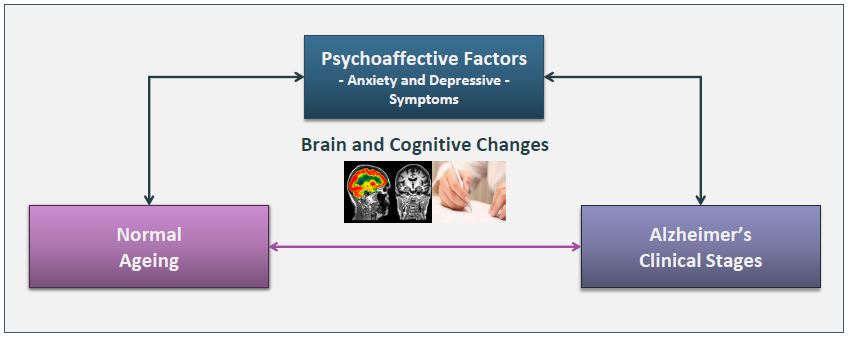Psychoaffective factors
As no effective treatment has been found yet, one of the main challenges in Alzheimer’s disease (AD) research is to work on (i) preventing the disease, thus focusing on risk factors and how to reduce them (ii) detecting the disease as early as possible and offering a close clinical follow-up, to limit the progression of AD. In the current literature, psychoaffective factors have been hypothesised as either a risk factor for AD (Petkus et al. 2016; for review: Harrington et al., 2015), early manifestations of the disease (Donovan et al., 2018; for review: Ma, 2020), or both (Banning et al., 2020).
Psychoaffective factors such as anxiety and depressive symptoms are recurrent symptoms in ageing, and are associated with a decrease in the quality of life of seniors. They might also be associated with sleep problems and cognitive disorders (Pink et al. 2016). In the context of AD dementia, it has been shown that anxiety and depression increase the risk of developing the disease (Petkus et al. 2016; for review: Harrington et al., 2015), and of progressing from the pre-dementia stage to the dementia stage (for review: Seignourel et al. 2008). It is therefore important to better understand and address these psychoaffective factors to improve the well-being and mental health of seniors.
In this context, the « Psychoaffective factors » research group aims at understanding how these psychoaffective factors relate to brain and cognitive health in normal ageing and AD, and if they can be modified by non-pharmacological interventions. More specifically, we are especially interested in (i) describing the links of anxiety and depressive symptoms, with age, cognition and neuroimaging measurements (i.e. amyloid and FDG-PET and structural MRI), in healthy elderly volunteers and across disease stages; (ii) assess the impact of a meditation or english training, in old age, on anxiety and depressive symptoms, and their cognitive and neuroimaging links, to reduce their adverse effects.
